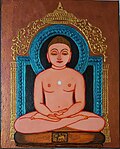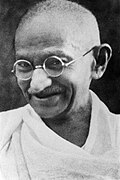Ahimsa
Ahimsa (also ahiṃsā, ahinsa, Sanskrit:अहिम्स) is a Sanskrit word which means "non-violence” or "non-injury". The practice of ahimsa is an important aspect of religions like Hinduism, Jainism and Buddhism. A person who practices ahimsa generally eats vegetarian foods. A religious person who practices ahimsa does not take part in animal sacrifice.
In twentieth century, Mohandas Karamchand Gandhi and Martin Luther King each followed a path of Ahimsa, though in different ways. They struggled without fighting, while asking for the rights of their followers.
Buddhism
The concept of ahiṃsā forms the base of Buddhism. In Buddhism, the first of the five basic vows (precepts) that are undertaken voluntarily by those who practice, is "I undertake the training rule to abstain from killing". In Buddhism, killing any living being out of passion is considered 'hiṃsā' (injury) and abstaining from such act is 'ahiṃsā' (non-injury or nonviolence).
Ahimsa Media
Lord Mahavira, the twenty-fourth tirthankara of Jainism, and "torch-bearer" of ahimsa
The 5th-century CE Tamil scholar Valluvar, in his Tirukkural, taught ahimsa and moral vegetarianism as personal virtues. The plaque in this statue of Valluvar at an animal sanctuary at Tiruvallur describes the Kural's teachings on ahimsa and non-killing, summing them up with the definition of veganism.
Gandhi promoted the principle of ahimsa by applying it to politics.
The hand with a wheel on the palm symbolises the Jain Vow of Ahimsa. The word in the middle is Ahimsa. The wheel represents the dharmacakra which stands for the resolve to halt the cycle of reincarnation through relentless pursuit of truth and non-violence.
References
Citations
- Vijay K. Jain (Ed.), Foreword by Acharya Vidyanand Muniraj (2012). Acharya Amritchandra's Purushartha Siddhyupaya: Realization of the Pure Self, With Hindi and English Translation. Vikalp Printers. ISBN 978-81-903639-4-5.





